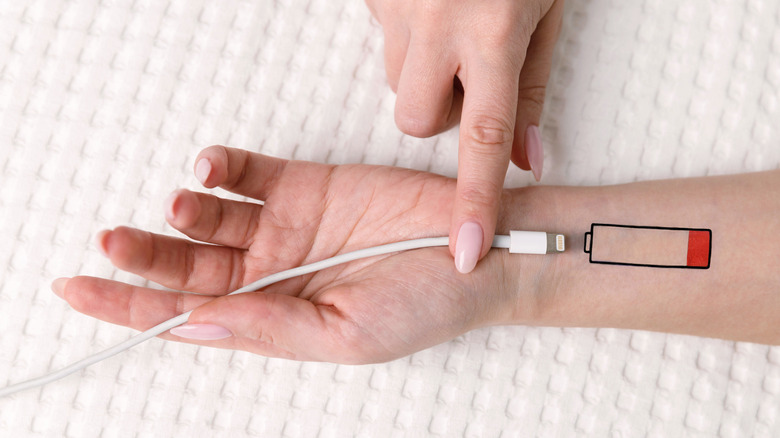What It Really Means When You Don't Have Any Energy
For some people, overwhelming fatigue and lack of energy throughout the day make it difficult to complete necessary tasks. Our bodies' ability to move around and function is often described by the term "energy," which actually has a biological basis. The biochemical material making up energy is a molecule called adenosine triphosphate (ATP) which is produced in the mitochondria of a cell, according to Harvard Medical School. The ATP molecule stores energy and delivers it to other cells. There are ways to boost ATP production.
If you're struggling with a lack of energy in your daily life, Harvard Medical School shares that making some changes to your diet could help. Eating nuts, fatty fish, and lean meats such as chicken or turkey can provide your body with fatty acids and protein that can help it produce more ATP. Instead of eating large meals, it's better to eat small meals and snacks every few hours to boost ATP. Staying hydrated can also be beneficial. Along with a modified diet, exercise can increase energy in your body by releasing neurotransmitters in the brain. Those who are more sedentary may benefit from at least 20 minutes of low-to-moderate exercise three days a week, as research suggests this can boost energy levels. Of course, getting more sleep can help, too.
While it helps to know the source of the energy in your body and how to increase your energy, it's also useful to consider why you may not have enough energy in the first place.
Why might you not have enough energy?
While it may not be unusual to feel fatigued occasionally, an ongoing lack of energy can signal that there may be something not quite right going on. According to Healthgrades, unrelenting fatigue that doesn't dissipate after implementing self-care measures could be a symptom of a psychological or physical disorder. Some medical conditions that may have fatigue as a symptom include asthma, anemia, cancer, heart disease, kidney disease, diabetes, dementia, and thyroid issues. Psychological concerns such as depression, grief, anxiety or eating disorders, or alcohol or drug use can also contribute to prolonged fatigue. Certain medications can also cause fatigue as a side effect.
Observing the patterns of your fatigue may help you pinpoint its cause, notes Healthgrades. For example, lack of energy that starts in the morning and lasts all day can be a sign of depression. However, if you notice physical symptoms like dry skin, constipation, or weight gain, it may be related to your thyroid.
A lack of energy related to the heart or lungs can manifest in additional symptoms such as chest pain, cough, dizziness, and shortness of breath. This can be due to conditions like congestive heart failure, heart valve disease, pneumonia, or chronic obstructive pulmonary disease (COPD). If concerning symptoms like dizziness, confusion, and severe pain accompany your fatigue, Healthgrades recommends seeking prompt medical care.
Reach out to your doctor if you're experiencing fatigue that doesn't go away, as they can provide you with a medical evaluation to discover the cause.


